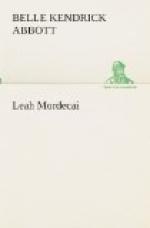“I feel no fear, Friend Mordecai, though I admit the summons is mysterious. If you will follow, I will lead the way. My curiosity impels me onward.”
“But there’s no watchman on this lonely beat, on this wild night, that we could summon in a moment of necessity; no street-lamp either, you see. It’s dark, fearfully dark! Had we not better wait till to-morrow?”
“No, come on. I am fond of adventure. Let’s see a little farther into this mystery;” and so saying, the rabbi boldly crossed the slippery street, Mr. Mordecai following timidly behind. They were soon standing in the narrow door-way that led up the stairs. They ascended slowly, and turning to the left, they discerned through the crevice beneath the door, a faint light. To this chamber they softly groped their way, and tapped gently on the door. No reply.
“Shall we go in?” whispered the banker. “This is an awfully suspicious place.”
“Yes, come on; I do not feel afraid.”
Gently turning the bolt, they opened the door; the lamp upon the table by the window revealed the contents of the apartment.
In a corner, upon a rude bed, lay a man, a negro, evidently sick, whose widely glaring eyes were turned upon the door, as if in expectation of their coming. Slowly lifting his hand as they entered, the sick man beckoned the gentlemen toward him. They drew near.
“Sir,” he said, and so faintly that his voice did not rise above a whisper, “I’m glad you come. I was ’feerd the rain would keep you away.” Then he grasped the hand of the rabbi with his cold, clammy fingers, and with an intense gaze of the wild eyes, said again, “Do you know me, Marster Abrams? Tell me, do you know me?”
The rabbi looked earnestly at him and after a moment’s pause said dubiously:
“Is it old Uncle Peter Martinet, the carrier of the ’Courier’?”
“De-same-marster, de-werry-same. But-de-end-ob-ole-Peter-is-nigh-at-hand, marster-wery nigh-at-hand! Las’-winter-was hard-an’-w’en de-work-ob de-Curyer-stop-it-went-mighty-hard-on-ole-Peter. De-rheumatiz-marster! De rheumatiz? Bref-so-short! Doctor-say-it’s-de-rheumatiz on-de-heart now. Mebbe so-marster-but-ole-Peter-mos’-done-now.”
“Can I do anything for you, Peter?” asked the rabbi kindly. “What will you have?”
At these words, the dying man, for he was dying, extended his other hand to Mr. Mordecai, and clasping his, said:
“Yes, marster-I want-somethin’. I-want-you-and-Mr. Mordecai-to-listen-to me; listen-to-me-a-moment. I-have-something-to-to-tell-you.”
“Certainly we will,” they replied gently, observing with pain the difficulty of the dying man’s utterance. “What do you wish to say?”
“You-see, Marster-Abrams, I-am-dying. Ole-Peter-mos-done. I-can-not-go-before God with-the-sin-upon-my-soul-that-now-distresses-me. I must tell it-for-I die.”
Here the old man strangled, from the effort made to communicate his story, and the rabbi, gently raising his head, administered a spoonful of water. Then, after a moment’s pause, he continued:




